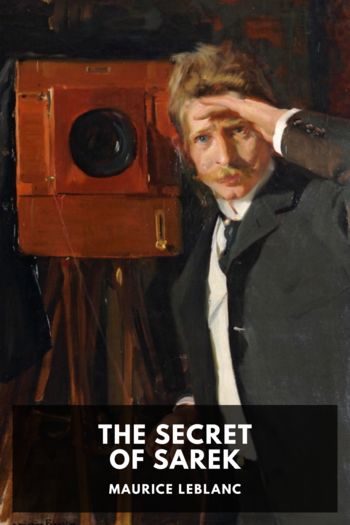The Eight Strokes of the Clock, Maurice Leblanc [summer books TXT] 📗

- Author: Maurice Leblanc
Book online «The Eight Strokes of the Clock, Maurice Leblanc [summer books TXT] 📗». Author Maurice Leblanc
“What plan?” asked Hortense. “For, after all, it’s only your assumption that there’s to be a victim and that the victim is to be flung off the top of the cliffs. You yourself told me that you heard no allusion to a possible murder.”
“That is so. But I heard some very plain words relating to the marriage of the brother or the sister with the wife or the husband of the third person, which implies the need for a crime.”
They were sitting on the terrace of the casino, facing the stairs which run down to the beach. They therefore overlooked the few privately-owned cabins on the shingle, where a party of four men were playing bridge, while a group of ladies sat talking and knitting.
A short distance away and nearer to the sea was another cabin, standing by itself and closed.
Half-a-dozen barelegged children were paddling in the water.
“No,” said Hortense, “all this autumnal sweetness and charm fails to attract me. I have so much faith in all your theories that I can’t help thinking, in spite of everything, of this dreadful problem. Which of those people yonder is threatened? Death has already selected its victim. Who is it? Is it that young, fair-haired woman, rocking herself and laughing? Is it that tall man over there, smoking his cigar? And which of them has the thought of murder hidden in his heart? All the people we see are quietly enjoying themselves. Yet death is prowling among them.”
“Capital!” said Rénine. “You too are becoming enthusiastic. What did I tell you? The whole of life’s an adventure; and nothing but adventure is worth while. At the first breath of coming events, there you are, quivering in every nerve. You share in all the tragedies stirring around you; and the feeling of mystery awakens in the depths of your being. See, how closely you are observing that couple who have just arrived. You never can tell: that may be the gentleman who proposes to do away with his wife? Or perhaps the lady contemplates making away with her husband?”
“The d’Ormevals? Never! A perfectly happy couple! Yesterday, at the hotel, I had a long talk with the wife. And you yourself. …”
“Oh, I played a round of golf with Jacques d’Ormeval, who rather fancies himself as an athlete, and I played at dolls with their two charming little girls!”
The d’Ormevals came up and exchanged a few words with them. Madame d’Ormeval said that her two daughters had gone back to Paris that morning with their governess. Her husband, a great tall fellow with a yellow beard, carrying his blazer over his arm and puffing out his chest under a cellular shirt, complained of the heat:
“Have you the key of the cabin, Thérèse?” he asked his wife, when they had left Rénine and Hortense and stopped at the top of the stairs, a few yards away.
“Here it is,” said the wife. “Are you going to read your papers?”
“Yes. Unless we go for a stroll? …”
“I had rather wait till the afternoon: do you mind? I have a lot of letters to write this morning.”
“Very well. We’ll go on the cliff.”
Hortense and Rénine exchanged a glance of surprise. Was this suggestion accidental? Or had they before them, contrary to their expectations, the very couple of whom they were in search?
Hortense tried to laugh:
“My heart is thumping,” she said. “Nevertheless, I absolutely refuse to believe in anything so improbable. ‘My husband and I have never had the slightest quarrel,’ she said to me. No, it’s quite clear that those two get on admirably.”
“We shall see presently, at the Trois Mathildes, if one of them comes to meet the brother and sister.”
M. d’Ormeval had gone down the stairs, while his wife stood leaning on the balustrade of the terrace. She had a beautiful, slender, supple figure. Her clear-cut profile was emphasized by a rather too prominent chin when at rest; and, when it was not smiling, the face gave an expression of sadness and suffering.
“Have you lost something, Jacques?” she called out to her husband, who was stooping over the shingle.
“Yes, the key,” he said. “It slipped out of my hand.”
She went down to him and began to look also. For two or three minutes, as they sheered off to the right and remained close to the bottom of the under-cliff, they were invisible to Hortense and Rénine. Their voices were covered by the noise of a dispute which had arisen among the bridge-players.
They reappeared almost simultaneously. Madame d’Ormeval slowly climbed a few steps of the stairs and then stopped and turned her face towards the sea. Her husband had thrown his blazer over his shoulders and was making for the isolated cabin. As he passed the bridge-players, they asked him for a decision, pointing to their cards spread out upon the table. But, with a wave of the hand, he refused to give an opinion and walked on, covered the thirty yards which divided them from the cabin, opened the door and went in.
Thérèse d’Ormeval came back to the terrace and remained for ten minutes sitting on a bench. Then she came out through the casino. Hortense, on leaning forward, saw her entering one of the chalets annexed to the Hôtel Hauville and, a moment later, caught sight of her again on the balcony.
“Eleven o’clock,” said Rénine. “Whoever it is, he or she, or one of the card-players, or one of their wives, it won’t be long before someone goes to the appointed place.”
Nevertheless, twenty minutes passed and twenty-five; and no one stirred.
“Perhaps Madame d’Ormeval has gone.”





Comments (0)